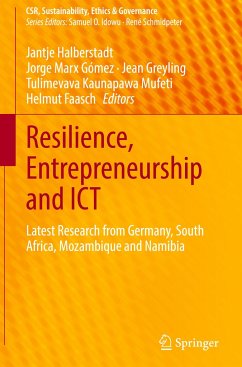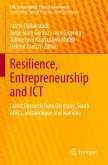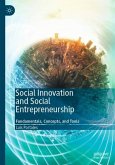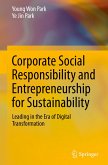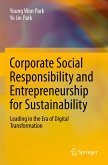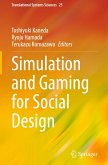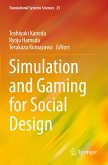Resilience, Entrepreneurship and ICT
Latest Research from Germany, South Africa, Mozambique and Namibia
Herausgegeben:Halberstadt, Jantje; Marx Gómez, Jorge; Greyling, Jean; Mufeti, Tulimevava Kaunapawa; Faasch, Helmut
Resilience, Entrepreneurship and ICT
Latest Research from Germany, South Africa, Mozambique and Namibia
Herausgegeben:Halberstadt, Jantje; Marx Gómez, Jorge; Greyling, Jean; Mufeti, Tulimevava Kaunapawa; Faasch, Helmut
- Gebundenes Buch
- Merkliste
- Auf die Merkliste
- Bewerten Bewerten
- Teilen
- Produkt teilen
- Produkterinnerung
- Produkterinnerung
This book is based on the work of the YEEES Research Centre, an international network of scientists from partner universities in Germany, Mozambique, Namibia and South Africa. It presents inter- and transdisciplinary research that explores different ways of understanding resilience, an essential characteristic for systems, organizations and people - providing them with strength in the face of attacks and challenges, and both enabling and fostering constant adaptation and improvement.
Building resilience to face today's ever-changing societal and environmental realities requires unbiased…mehr
Andere Kunden interessierten sich auch für
![Resilience, Entrepreneurship and ICT Resilience, Entrepreneurship and ICT]() Resilience, Entrepreneurship and ICT123,99 €
Resilience, Entrepreneurship and ICT123,99 €![7 Secrets of Highly Effective Social Impact Communicators 7 Secrets of Highly Effective Social Impact Communicators]() Nate Birt7 Secrets of Highly Effective Social Impact Communicators21,99 €
Nate Birt7 Secrets of Highly Effective Social Impact Communicators21,99 €![Social Innovation and Social Entrepreneurship Social Innovation and Social Entrepreneurship]() Luis PortalesSocial Innovation and Social Entrepreneurship66,99 €
Luis PortalesSocial Innovation and Social Entrepreneurship66,99 €![Corporate Social Responsibility and Entrepreneurship for Sustainability Corporate Social Responsibility and Entrepreneurship for Sustainability]() Young Won ParkCorporate Social Responsibility and Entrepreneurship for Sustainability100,99 €
Young Won ParkCorporate Social Responsibility and Entrepreneurship for Sustainability100,99 €![Corporate Social Responsibility and Entrepreneurship for Sustainability Corporate Social Responsibility and Entrepreneurship for Sustainability]() Young Won ParkCorporate Social Responsibility and Entrepreneurship for Sustainability100,99 €
Young Won ParkCorporate Social Responsibility and Entrepreneurship for Sustainability100,99 €![Simulation and Gaming for Social Design Simulation and Gaming for Social Design]() Simulation and Gaming for Social Design108,99 €
Simulation and Gaming for Social Design108,99 €![Simulation and Gaming for Social Design Simulation and Gaming for Social Design]() Simulation and Gaming for Social Design108,99 €
Simulation and Gaming for Social Design108,99 €-
-
-
This book is based on the work of the YEEES Research Centre, an international network of scientists from partner universities in Germany, Mozambique, Namibia and South Africa. It presents inter- and transdisciplinary research that explores different ways of understanding resilience, an essential characteristic for systems, organizations and people - providing them with strength in the face of attacks and challenges, and both enabling and fostering constant adaptation and improvement.
Building resilience to face today's ever-changing societal and environmental realities requires unbiased research activities that transcend the borders of countries and academic disciplines alike. The research addressed in this book, thus, is multidisciplinary and includes contributions to areas such as sustainable agriculture, entrepreneurial ecosystems, and smart communities, as well as groundbreaking work on skills development and ICT education. Highlighting the variety of research activitiesand their outcomes, this book offers a valuable resource for researchers and practitioners in the fields of sustainable resilience development.
Building resilience to face today's ever-changing societal and environmental realities requires unbiased research activities that transcend the borders of countries and academic disciplines alike. The research addressed in this book, thus, is multidisciplinary and includes contributions to areas such as sustainable agriculture, entrepreneurial ecosystems, and smart communities, as well as groundbreaking work on skills development and ICT education. Highlighting the variety of research activitiesand their outcomes, this book offers a valuable resource for researchers and practitioners in the fields of sustainable resilience development.
Produktdetails
- Produktdetails
- CSR, Sustainability, Ethics & Governance
- Verlag: Springer / Springer International Publishing / Springer, Berlin
- Artikelnr. des Verlages: 978-3-030-78940-4
- 1st edition 2021
- Seitenzahl: 456
- Erscheinungstermin: 28. September 2021
- Englisch
- Abmessung: 241mm x 160mm x 30mm
- Gewicht: 846g
- ISBN-13: 9783030789404
- ISBN-10: 3030789403
- Artikelnr.: 61847613
- Herstellerkennzeichnung Die Herstellerinformationen sind derzeit nicht verfügbar.
- CSR, Sustainability, Ethics & Governance
- Verlag: Springer / Springer International Publishing / Springer, Berlin
- Artikelnr. des Verlages: 978-3-030-78940-4
- 1st edition 2021
- Seitenzahl: 456
- Erscheinungstermin: 28. September 2021
- Englisch
- Abmessung: 241mm x 160mm x 30mm
- Gewicht: 846g
- ISBN-13: 9783030789404
- ISBN-10: 3030789403
- Artikelnr.: 61847613
- Herstellerkennzeichnung Die Herstellerinformationen sind derzeit nicht verfügbar.
Prof. Dr. Jantje Halberstadt is a professor of Economics and Sustainability at the University of Vechta, Germany, where she is also Dean of Studies at the Faculty of Education and Social Sciences. Her main research interests are in the area of entrepreneurship and management, particularly transformational sustainability entrepreneurship related to various fields, such as ICT, agriculture and food, mobility, and gender studies. She is Vice-Director of the ISPA institute and board member of FGF e.V., Germany`s leading scientific association for entrepreneurship, innovation, and SMEs, as well as member of the advisory board of the Yunus Centre for Social Business and Values. Prof. Halberstadt also lectures abroad and leads several trans- and interdisciplinary research projects with national and international groups. She holds a PhD from the Carl von Ossietzky University of Oldenburg and was Junior Professor for Social Entrepreneurship at the Leuphana University in Lüneburg where she still is Guest Professor. Prof. Dr. Jorge Marx Gómez is a full professor and chair of Business Information Systems / Very Large Business Applications (VLBA) at the Carl von Ossietzky University of Oldenburg, Germany. He is furthermore the director of the Centre for Environmental and Sustainability Research (COAST) at Oldenburg University and board member of the energy group at OFFIS-Institute. His research interests include business information systems, federated ERP-systems, business intelligence, data science, interoperability, environmental management information systems, ICT for sustainability and e- and mobile-commerce. Prof. Gómez has worked as guest lecturer in different countries and has successfully coordinated many national and international research projects. Prof. Dr. Jean Greyling is an associate professor of Computer Science at the Nelson Mandela University in Gqeberha, South Africa. From 2010 - 2015 he was Head of Department of Computing Sciences. He currently coordinates a national project aimed at using mobile apps to introduce learners from disadvantaged communities to coding, reaching over 20 000 learners. This project is part of the YEEES project. His main research interest is programming awareness in schools, and he has supervised masters and PhD's from different fields of interest. He is also very actively involved in sourcing full bursaries for undergraduate students in the department - currently there are 90 students who benefit from this. Prof. Tulimevava Kaunapawa Mufeti (Kauna) is an Associate Professor in Information Systems at the University of Namibia. She holds a PhD in Information Systems from Rhodes University, South Africa. She worked as the Associate Dean of the School of Computing at the University of Namibia from 2015-2021, and has served as a director of the Communications Regulatory Authority of Namibia. Her research interests include e-learning, cybersecurity, and data analysis. Prof. Dr. Helmut Faasch is a professor of Computer Science at the Leuphana University at Lueneburg. Before he retired, he was a member of the Institute of Environmental and Sustainability Communication (INFU). His lectures included Data Base Systems, Computer Networks, Software Development, Mobile Commerce, Knowledge Representation, Fundamentals of Computer Science and Sustainable Communication. As an independent consultant, he worked in the fields of Data Modelling, Object Oriented Software Design and Digital Technical Documentation, particularly in the areas of the international aviation industry and automotive business. As such, he was a leading member of the Air Transport Association (ATA) standardization teams. His research interests include ICT for sustainability, software design principles, artificial intelligence, digital transformation, and data science. Prof. Faasch worked as a guest professor at the "University of Texas Pan American", Edinburg/Texas and the "Athlone Institute of Technology", Ireland.
Section A. Resilience and Entrepreneurial Activities.- Chapter 1. How to make entrepreneurs strong - Introducing a framework for research on entrepreneurs' resilience.- Chapter 2. Toward a Framework for University-based Entrepreneurial Ecosystems and Human Capital Development in Sub-Saharan Africa.- Chapter 3. Innovative Digitalization Initiatives for Smart Communities and Cities in a Developing Country.- Chapter 4. An Exploratory Study of the Development Practices Used by Software Entrepreneurs in Namibia.- Section B. Resilience through Learning and Teaching.- Chapter 5. TANKS - a tangible programming tool to introduce children to coding through fun problem solving activities.- Chapter 6. Use of augmented Reality Mobile Devices to Support Teaching and Learning Agriculture and Livestock Students.- Chapter 7. Developing an ERP Skills Program to Build ICT Capacity for Disadvantaged South African Youths.- Section C. Resilience in Smart Communities.- Chapter 8. Identifying Stakeholder Value in Smart City Implementation in Nelson Mandela Bay Municipality.- Chapter 9. Smart Communities ICT responses to Covid-19 in the South African Smartest City. A Resilient Approach to Social Solidarity through Physical Distancing.- Chapter 10. Organisation of urban farmers and urban food resilience: What can we learn from the experiences of Cape Town and Dar es Salaam?.- Chapter 11.Smart Energy Sharing in a German Living Lab From Participation to Business Model.- Chapter 12. How to Measure Safety Risks for Cyclists at Intersections?.- Section D. Resilience through the Smart Use of Resources.- Chapter 13. Geographic Information System for forecast and control of soil erosion. Case study: Marmanelo and Caminhos de Ferro de Moçambique Neighbourhoods in the city of Mocuba.- Chapter 14. Digitalization of Groundwater Monitoring Points using LoRaWAN.- Chapter 15. Developing an Environmental Information Portal for Various User Groups.- Chapter 16. A Deep Learning approach to Classifying Tyres Using Sidewall Images.- Chapter 17. A Backup Model: (QoS guaranteed and Less Consumed Energy) for Cloud SDN Using Neural Networks.- Section E. Resilience through Culture.- Chapter 18. Social Network Platforms and the Oshiwambo Practice of Eengano.- Chapter 19. An Investigation of E-Government Web Accessibility for Visually Impaired Persons in Namibia.
Section A. Resilience and Entrepreneurial Activities.- Chapter 1. How to make entrepreneurs strong - Introducing a framework for research on entrepreneurs' resilience.- Chapter 2. Toward a Framework for University-based Entrepreneurial Ecosystems and Human Capital Development in Sub-Saharan Africa.- Chapter 3. Innovative Digitalization Initiatives for Smart Communities and Cities in a Developing Country.- Chapter 4. An Exploratory Study of the Development Practices Used by Software Entrepreneurs in Namibia.- Section B. Resilience through Learning and Teaching.- Chapter 5. TANKS - a tangible programming tool to introduce children to coding through fun problem solving activities.- Chapter 6. Use of augmented Reality Mobile Devices to Support Teaching and Learning Agriculture and Livestock Students.- Chapter 7. Developing an ERP Skills Program to Build ICT Capacity for Disadvantaged South African Youths.- Section C. Resilience in Smart Communities.- Chapter 8. Identifying Stakeholder Value in Smart City Implementation in Nelson Mandela Bay Municipality.- Chapter 9. Smart Communities ICT responses to Covid-19 in the South African Smartest City. A Resilient Approach to Social Solidarity through Physical Distancing.- Chapter 10. Organisation of urban farmers and urban food resilience: What can we learn from the experiences of Cape Town and Dar es Salaam?.- Chapter 11.Smart Energy Sharing in a German Living Lab From Participation to Business Model.- Chapter 12. How to Measure Safety Risks for Cyclists at Intersections?.- Section D. Resilience through the Smart Use of Resources.- Chapter 13. Geographic Information System for forecast and control of soil erosion. Case study: Marmanelo and Caminhos de Ferro de Moçambique Neighbourhoods in the city of Mocuba.- Chapter 14. Digitalization of Groundwater Monitoring Points using LoRaWAN.- Chapter 15. Developing an Environmental Information Portal for Various User Groups.- Chapter 16. A Deep Learning approach to Classifying Tyres Using Sidewall Images.- Chapter 17. A Backup Model: (QoS guaranteed and Less Consumed Energy) for Cloud SDN Using Neural Networks.- Section E. Resilience through Culture.- Chapter 18. Social Network Platforms and the Oshiwambo Practice of Eengano.- Chapter 19. An Investigation of E-Government Web Accessibility for Visually Impaired Persons in Namibia.

